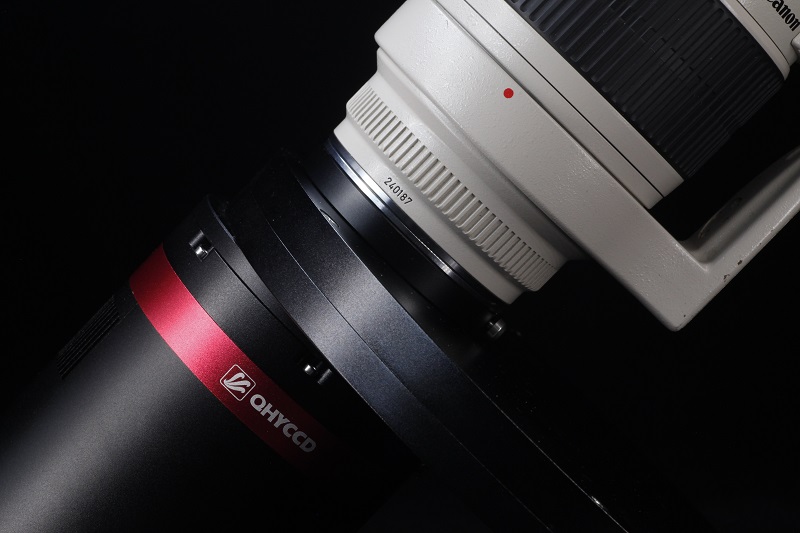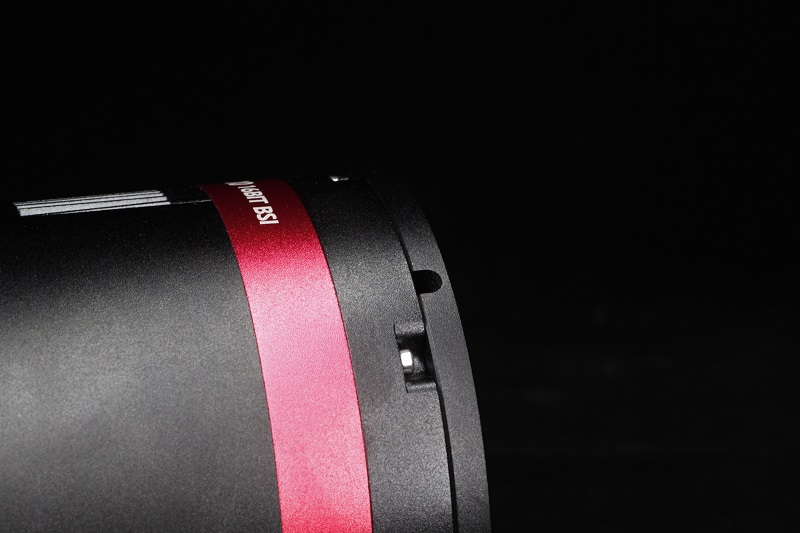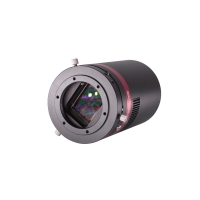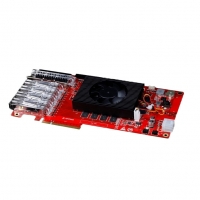QHY600M/C-PRO I Professional Camera
Starting Price: $8,799.00
Price as Configured: $8,799.00
Price as Configured: $8,799.00
Brand: QHYCCD / SKU: QHY-600M/C-PRO
If you would like enable the 2x10 Gigabit fiber port function on the QHY600 Pro camera, please select the add-on below for the PCIE Grabber Card.
QHY also offers a liquid-cooled option for the QHY600 PRO. Please contact us for pricing.
SHIPPING NOTE: Shipping cost will be determined after the order is made and must be paid before the camera will ship. A shipping quote can be obtained on request.

Need help deciding?
Tell us what you're looking for, and we’ll point you in the right direction. Email Us.
Tell us what you're looking for, and we’ll point you in the right direction. Email Us.
QHY600PRO has a back-illuminated structure technology, and QE is up to 90%. It has a very low readout noise performance; it can get 1.1e- at the highest gain. It has a typical 51ke full-well in high gain readout mode and a typical 80ke readout in extending full-well mode. The camera supports the 2-cms readout mode (sample the same signal twice and averaged on the sensor) and it can get the readout noise 1.3times less than normal readout mode.
QHY600PRO has an extremely good linear response in the whole full-well range. It also has zero amplifier glow and zero RBI remains performance.
QHY offers a Short Back Focal Length version (SBFL) is specially designed for DSLR lens users or those who has special requirement of short back focal length. This version has a 14mm BFL. The BFL equals 12.5mm when connecting a QHYCFW with the adapter. It can easily match Canon/Nikon lens even with filter wheel.


Native 16 bit A/D: The Sony sensor has native 16-bit A/D on-chip. The output is real 16-bits with 65536 levels. Compared to 12-bit and 14-bit A/D, a 16-bit A/D yields higher sample resolution and the system gain will be less than 1e-/ADU with no sample error noise and very low read noise.
BSI: One benefit of the back-illuminated CMOS structure is improved full well capacity. This is particularly helpful for sensors with small pixels. In a typical front-illuminated sensor, photons from the target entering the photosensitive layer of the sensor must first pass through the metal wiring that is embedded just above the photosensitive layer. The wiring structure reflects some of the photons and reduces the efficiency of the sensor. In the back- illuminated sensor, the light is allowed to enter the photosensitive surface from the reverse side. In this case the sensor’s embedded wiring structure is below the photosensitive layer. As a result, more incoming photons strike the photosensitive layer, and more electrons are generated and captured in the pixel well. This ratio of photon to electron production is called quantum efficiency. The higher the quantum efficiency, the more efficient the sensor is at converting photons to electrons, and hence the more sensitive the sensor is to capturing an image of something dim.
Zero Amplify Glow: This is also a zero amplifier-glow camera.
True Raw Data: QHY Cameras offer true raw image output and produce an image comprised of the original signal only, thereby maintaining the maximum flexibility for post-acquisition astronomical image processing programs and other scientific imaging applications.
Anti-Dew Technology: Based on almost 20-year cooled camera design experience, QHY cooled cameras have implemented a full dew control solution. The optic window has a built-in dew heater and the chamber is protected from internal humidity condensation. An electric heating board for the chamber window can prevent the formation of dew and the sensor itself is kept dry with a silicon gel tube socket design for control of humidity within the sensor chamber.
Cooling: In addition to dual stage thermoelectric cooling, QHY implements proprietary hardware technology to control the dark current noise.
General Introduction of QHY Pro-grade Products
2*10Gigabit high-speed Fiber Optic interfaces: The 2*10Gigabit Fiber Optic Interface (to be used with QHYCCD fiber optic capture card) meets the high-intensity data transmission requirements of professional fields such as professional observatories. It has the following advantages over the USB 3.0 interface:
- Higher data rates: using two 10G fiber optics, it can achieve a speed of 1.6GBytes/s, while the standard USB 3.0 has a rate of 5Gbps, with an actual maximum transfer rate of 350MBytes/s.
- Longer transmission distance: Fiber optic transmission can cover distances hundreds of times longer than USB 3.0. Standard USB 3.0 can only transmit up to 3 to 5 meters, and even with an active powered USB cable, it can reach up to 10 to 15 meters. In contrast, QHYCCD’s standard fiber optic module can achieve a transmission distance of up to 300 meters, and when paired with long-distance transmission optical modules, it can cover distances of several tens of kilometers.
- Stable transmission without electromagnetic interference: USB 3.0 transmission can be susceptible to external electromagnetic interference, static electricity, leakage, and other factors, leading to data packet corruption, image loss, or camera control issues. Optical communication is not affected by electromagnetic interference.
- Supports the professional Camera Link interface (exclusive to Pro II products): The Camera Link interface is a more suitable choice if your use case involves shorter transmission distances in industrial or laboratory areas. The Camera Link interface is specifically designed for high-speed and high-resolution cameras, offering fast data transmission speeds. It is well-suited for working under conditions where there is a large amount of image data and high bandwidth requirements.
- 6-pin GPIO interface: This product supports a 6-pin GPIO interface, which can be defined for different modes. QHYCCD can customize it according to the user’s requirements, and users can also reprogram the FPGA to meet more complex needs.

- More efficient cooling. When using ambient temperature pure water for water cooling, the maximum cooling temperature is about 10 degrees Celsius lower than that of air cooling. QHYCCD is improving its support for ultra-low temperature liquid cooling.
- No vibration. No matter how high-quality the fan is, it is inevitable that it will generate some image jitter. The water-cooled version does not have moving mechanical parts that cause camera vibration, thus avoiding negative effects on the image.
- No turbulent hot air. For certain cameras that need to be installed in front of the optical system, such as Schmidt-Cassegrain telescopes, the hot air generated by air cooling systems may cause slight interference with the optical path. Water cooling does not produce this kind of impact.
Advanced Functions
Multiple Readout Modes: Multiple Readout Modes are special for QHY 16-bit Cameras (QHY600/268/461/411). Different readout modes have different driver timing, etc., and result in different performance.
Random change thermal noise suppression function: Some types of thermal noise can change with time in some back-illuminated CMOS cameras. This thermal noise has the characteristic of the fixed position of typical thermal noise, but the value is not related to the exposure time. Instead, each frame appears to have its own characteristics. The QHY600/268/461/411 use an innovative suppression technology that can significantly reduce the apparent level of such noise.
UVLO Protection: UVLO (Under Voltage Locking) protects the electronic device from damage caused by abnormally low voltages. The actual operational voltage of an electrical device must not significantly exceed the rated voltage, otherwise it will be damaged. For precision camera equipment, long-term functioning at too low input voltage can also be detrimental to the working life of the camera. Some devices, such as power manager, may burn up due to long-term overload. The camera will give a warning when the input voltage of the camera is below 11V.
Optimizing USB Traffic to Minimize Horizontal Banding: It is common behavior for a CMOS sensor to contain some horizontal banding. Normally, random horizontal banding can be removed with multiple frame stacking so it does not affect the final image. However, periodic horizontal banding is not removed with stacking so it may appear in the final image. By adjust the USB traffic in Single Frame mode or Live Frame mode, you can adjust the frequency of the CMOS sensor driver and it can optimize the horizontal banding, effectively removing the periodic banding in some conditions.









